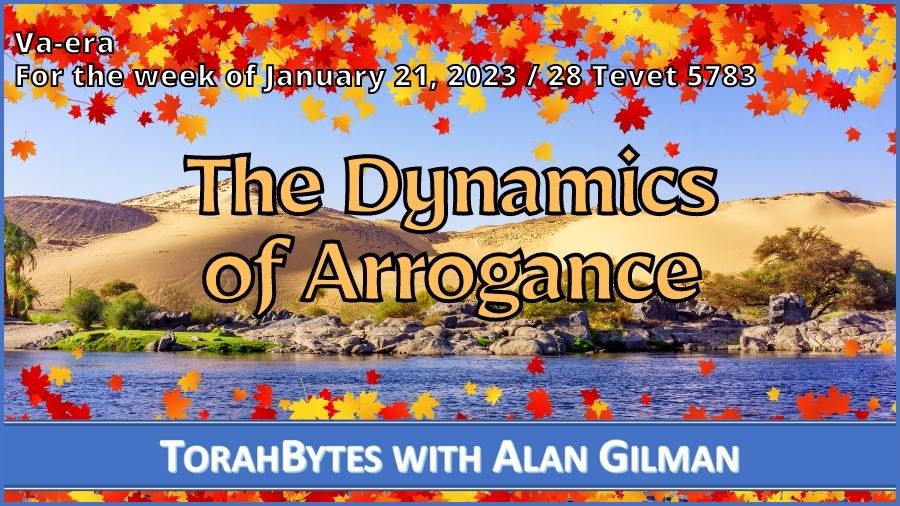For the week of January 21, 2023 / 28 Tevet 5783

Va-era
Torah: Shemot/Exodus 6:2 – 9:35
Haftarah: Ezekiel 28:25 – 29:21
Download Audio [Right click link to download]
Therefore thus says the Lord GOD: Behold, I will bring a sword upon you, and will cut off from you man and beast, and the land of Egypt shall be a desolation and a waste. Then they will know that I am the LORD. “Because you said, ‘The Nile is mine, and I made it,’ therefore, behold, I am against you and against your streams, and I will make the land of Egypt an utter waste and desolation, from Migdol to Syene, as far as the border of Cush. (Ezekiel 29:8-10)
This week’s haftarah (excerpt from the Hebrew prophets) was most likely selected due to its references to Egypt and, particularly, Pharaoh, Egypt’s king. Both are concerned with God’s judgment on Pharaoh and his land even though the circumstances addressed by Ezekiel are very different from those faced by Moses. In Moses’ day, Israel had witnessed God’s heavy hand of judgment upon Pharaoh for refusing to heed God’s demand to let his people go. Centuries later Ezekiel prophesied an even greater devastation upon Egypt. It isn’t clear if the “desolation and waste” mentioned in the verses I quoted occurred around that time or if it is yet in the future. That doesn’t concern me as much as the reason stated by God for his harsh judgment.
Pharaoh’s arrogance in Ezekiel’s day is captured by God’s rebuke of Pharaoh’s saying, “The Nile is mine, and I made it.” The Nile River played a most essential role in Egypt. The country’s agriculture and economy were dependent on the Nile. The Land of Israel had relatively little fresh water and was thus utterly dependent on rain for survival. If sufficient rain didn’t fall at the right time of year, drought and famine would be the result. The Nile, on the other hand, functioned as a reliable, continual water source for Egypt despite its being surrounded by desert.
The presence of such a water resource would naturally lead the Egyptians to have a great sense of security. They were aware of their special possession especially in contrast to the intense water needs of their neighbors. It is understandable that such a culture would regard themselves as specially favored by their gods. One might think that the events of Moses’ time would have cured them of such a perspective but evidently not. In fact, not only would Egypt take pride in their gods, Pharaoh also eventually regarded himself in divine terms, identifying, or more correctly, overidentifying with his gods to the extent that he took credit for creating the Nile. I would expect most moderns to react to such a claim as rooted in a misguided worldview of foolish superstitions. However it was that Pharaoh came to assert such a claim, God deemed it worthy of devastating consequences.
How did Pharaoh come to think of himself in this way? Did he really and truly believe he made the Nile? Perhaps it was common in his culture to regard the king as the incarnation of a deity. Perhaps there are countries today that still think this way, but could you imagine in Canada where I live, for example, having a special ceremony where a priest or holy man waves his hand over our Prime Minister to transform him from a normal human being like the rest of us into the personification of some god or other? From that point on, whatever he says is the god’s word, while everyone else must obey or be killed. When he walks by, his people must bow in deference as he proclaims, “The maple syrup is mine, and I made it!”
I trust you’re chuckling. But think again. While world leaders generally don’t speak in such deified terms, they and those who support them are increasingly regarding themselves as the great benefactors of their people. I cannot remember how many times in the past three years our Prime Minister has said that it is his responsibility to keep Canadians safe, warming the hearts of an apparent majority of the population. Without getting into the technicalities of our parliamentary system, when did that become his responsibility? When a country’s leader begins to assume the role of ultimate parent, assuming he or she has the authority and power to determine what constitutes safe and healthy behavior, it isn’t long before they have taken the role of God.
This kind of arrogance, with or without replicating Pharaoh’s type of wording, is becoming more and more common among all sorts of authorities in traditional democracies. As God himself is neglected by a growing number of people, human authority naturally takes his place. Such a course will not end well.
Scriptures taken from the English Standard Version